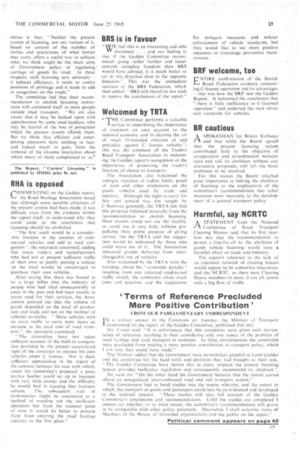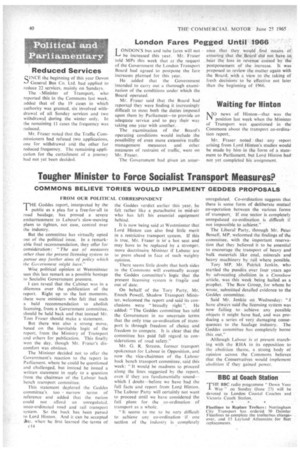Terms of Reference Precluded More Positive Contribution'
Page 37

Page 42

If you've noticed an error in this article please click here to report it so we can fix it.
FROM OUR PARLIAMENTARY CORRESPONDENT IN a written answer in the Commons on Tuesday, the Minister of Transport I commented on the report of the Geddes Committee, published that day.
Mr. Fraser " It is unfortunate that this committee were given such narrow terms of reference, resulting in their considering only one aspect of the problem of road haulage and road transport in isolation. In these circumstances the committee were precluded from making a more positive contribution to transport policy, which I am sure they could have made."
The Minister added that the Government were nevertheless grateful to Lord Geddes and the committee for the hard work and devotion they had brought to their task. " The Geddes Committee have shown that in many respects the present licensing system provides ineffective regulation and consequently recommend its abolition ".
He went on: " On the other hand the Government believes that the nation cannot afford an unregulated, unco-ordinated road and rail transport system."
The Government had in hand studies into the means whereby, and the extent to which, the transport of goods and passengers could best be co-ordinated and developed in the national interest. " These studies will take full account of the Geddes Committee's conclusions and recommendations. Until the studies are completed I cannot say whether, or to what extent, the committee's recommendations will prove to he compatible with other policy proposals. Meanwhile I shall welcome views of Members of the House, of interested organizations and the public on the report."
THE Geddes report, interpreted by the public as a plea for a free-for-all in road haulage, has proved a severe embarrassment to Labour's slow-moving plans to tighten, not ease, control over the industry.
But the committee has virtually opted out of the political issue. In a remarkable final recommendation, they offer for consideration: "The use of measures other than the present licensing system to pursue any further aims of policy which the Government might have."
Wise political opinion at Westminster sees this last remark as a possible hostage to Socialist Government pressure.
I can reveal that the Cabinet was in a dilemma over the publication of the report. Right up to the last moments, there were ministers who felt that such a bald recommendation to abolish licensing. from a Government committee, should be held back and that instead Mr. Tom Fraser should make a statement.
But there was also a strong move, based on the inevitable logic of the report. from the Ministry of Transport and others for publication. This finally won the day, though Mr. Fraser's discomfort was obvious.
The Minister decided not to offer the Government's reaction to the report in Parliament, where he could be questioned and challenged, but instead he issued a Written statement in reply to a question from the chairman of the Labour back bench transport committee.
This statement deplored the Geddes committee's too narrow terms of reference and added that the nation could not afford an unregulated. unco-ordinated road and rail transport system. So the buck has been passed to ,Lord Hinton. And it can be accepted
■ .bat. when he first learned the terms of c14
the Geddes verdict earlier this year. he felt rather like a parachutist in mid-air who has left his essential equipment behind.
It is now being said at Westminster that Lord Hinton can also find little merit in a restrictive transport system. If this is true. Mr. Fraser is in' a hot seat and may have to be replaced by a stronger, more doctrinaire Minister if Labour are to press ahead in face of such weighty opinion.
There seems little doubt that both sides in the Commons will eventually accept the Geddes committee's logic that the present licensing system is fragile and out of date.
On behalf of the Tory Party, Mr. Enoch Powell, Shadow Transport Minister, welcomed the report and said its con
clusions were "broadly right ". He added: "The Geddes committee has told the Government in no uncertain terms that the only true co-ordination of transport is through freedom of choice and freedom to compete. It is clear that the committee has paid full regard to considerations of road safety."
Mr. G. R. Strauss, former transport spokesman for Labour in Opposition, and now the vice-chairman of the Labour back bench transport committee, said this week: "it would be madness to proceed along the lines suggested by the report, even if they are fundamentally sound— which I doubt—before we have had the full facts and report from Lord Hinton. The Labour Party will certainly not want to proceed until we have considered the full plans for the co-ordination of transport as a whole.
"It seems to me to be very difficult to achieve any co-ordination if one section of the industry is completely
unregulated. Co-ordination suggests that there is some form of deliberate mutual co-operation between the various forms of transport, If one sector is completely unregulated co-ordination is difficult if not impossible to achieve."
The Liberal Party, through Mr. Peter Bessell, MP. welcomed the findings of the committee, with the important reservation that they believed it to be essential to encourage the transport of heavy and bulk materials like coal, minerals and heavy machinery by rail where possible.
Tory MP. Mr. Patrick Jenkin, who startled the pundits over four years ago by advocating abolition in a Crossbow article, was this week being hailed as a prophet. The Bow Group, for whom he wrote, submitted detailed evidence to the Geddes committee.
Said Mr. Jenkin on Wednesday: ",I have always said the licensing system was now failing to achieve any possible objects it might have had, and was producing a series of very damaging consequences to the haulage industry. The Geddes committee has completely borne this out.
Although Labour is at present marching with the RHA in its opposition to the abolition theme, a strong body of opinion across the Commons believes that the Conservatives would implement abolition if they gained power.




























































































































